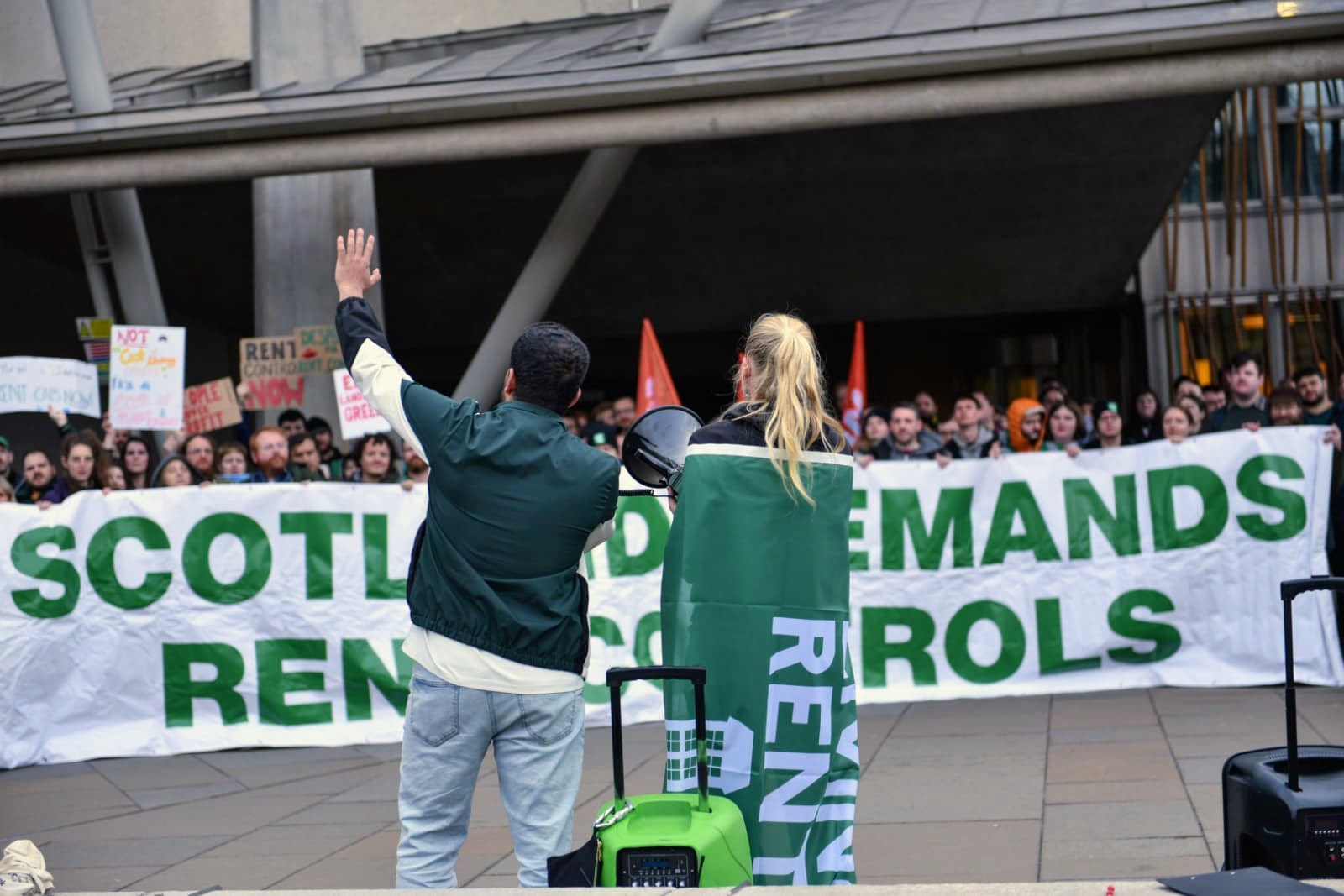Scotland’s New Rent Controls Put Starmer’s Measly Reforms to Shame
‘Renters’ rights bill’ versus actual rent controls.
by Gordon Maloney
20 October 2025

At the end of September, 40 years after Margaret Thatcher scrapped rent controls – and after a decade of campaigning by Living Rent, the Scottish tenants’ union for which I’m an organiser – the Scottish government finally reintroduced them, the first country in the UK to do so.
The newly-passed Housing (Scotland) Act will allow local authorities to introduce rent control areas, in which rent increases for private tenants – both within and in between tenancies – will be capped at the consumer prices index plus 1%, or a maximum of 6% per year. This is sorely necessary and well overdue – and won’t come into effect until 2027.
Since 2010, rents in Scotland have increased by an average of more than 60%. In Edinburgh, they have doubled. In Glasgow, rents have increased by 30% in just three years. Landlords, lobbyists and politicians insist that the problem is one of supply and demand. If we simply build more homes, skyrocketing rents will correct themselves.
Not only does this argument neglect the fact that the financialisation of housing means that portfolio landlords will simply snap up any new properties that are built, but the mantra of “build, baby, build” also depends on public subsidies, the rollback of environmental protections and quietly removing developers’ obligations to build social housing. For half a century – including at times of historically cheap credit – developers have failed miserably to build actually affordable housing, instead throwing up luxury build-to-rent blocks that no ordinary people can afford. Last year, developers completed fewer than 1,200 affordable homes across all of Scotland. Meanwhile, the far right continues to capitalise on the crisis: listen to participants of the anti-migrant protests that have swept the UK, and complaints about housing are one of the first you’ll hear. Reform UK Scotland gleefully points to the housing crisis as a key argument against migration.
We do, of course, need to build more genuinely affordable, social housing – public housing for the public good. But we also cannot wait decades for those houses to be built. We need change now, and rent controls are that change. Rent controls could, overnight, transform housing – improving affordability for millions of tenants at the stroke of a pen and slashing the billions in public money currently subsidising unaffordable private rents.
In 2014, when Living Rent first began our campaign for rent controls, the idea was firmly on the fringes of Scottish politics. Mainstream housing organisations like Shelter dismissed it outright, framing it as a distraction from the ‘real issue’ of supply, and our call faced fierce opposition – not only from the landlord and developer lobby, but also rightwingers within the SNP and Holyrood. Now, an idea long seen as pie-in-the-sky is the reality for 370,000 households that rent privately in Scotland.
One of the most consequential victories in the fight over this bill was securing a system of rent controls that applies not only to increases within tenancies, but also between them. That might sound like a technicality, but without protections between tenancies, in-tenancy rent controls create dangerous incentives for landlords to force new tenancies, or evict renters, simply to raise the rent. By winning caps that also apply between tenancies, the bill closed off those loopholes.
That said, the new bill is far from perfect. In a series of last-minute amendments (the bill had around 400 by the time it was passed), the Scottish government dramatically diluted the bill, granting landlords exemptions for vaguely defined “mid-market rent” and “build-to-rent” schemes. The bill’s enforcement mechanisms are also worryingly weak – putting much of the onus on tenants themselves to challenge increases above the cap. But even with these concessions, the bill remains one of the most progressive changes to housing legislation anywhere in the UK in the past 50 years – and a crushing defeat for one of the wealthiest and most powerful lobbies in Scottish politics (to give just one example, landlords crowdfunded £300,000 for a successful judicial review of the Scottish government attempt to regulate holiday lets in Edinburgh, which the BBC reported “was said to be largest amount raised for a case in the UK”). We won by refusing to play our opponents at their own game.
We were determined that Living Rent be a democratic, mass-membership union, not some kind of slick lobby group, the mirror image of Shelter or the Scottish Association of Landlords. Our campaign for rent controls was built around the mass mobilisation of tenants, prioritising direct action to confront landlords over a model of respectability politics. The reason was that we knew backroom deals would only ever secure victories acceptable to insiders, and we weren’t interested in those.
Living Rent’s push for rent controls was boosted by a continental tailwind. Our victory has taken place during a sharply renewed focus on housing justice from the European left, from Berlin’s expropriation referendum to rent strikes and anti-gentrification protests across Spain. This is just the latest wave of tenant organising, of course.
It was tenant-crofters in the Highlands who, in the 1880s, fought off the British army, which had been sent to the Isle of Skye on a gunship to break up a rent strike, forcing an end to the brutality of the Highland Clearances.
30 years later, renter-strikers in Glasgow won a system of rent controls that stayed in place until Thatcher scrapped them 70 years later. Those rent strikes, which quickly spread across Scotland, were central in forcing the British government to begin one of the world’s most ambitious programs of slum clearances and public housing building.
Compared with Britain’s historic efforts to improve rented housing, the rent controls we’ve helped win are just a start – and Labour’s renters’ rights bill is laughable. The Westminster bill plans to abolish no-fault evictions in England and Wales, something originally promised by the Tories. But as we learned the hard way in Scotland, abolishing no-fault evictions is meaningless without rent controls: landlords do not need to evict you if they can simply price you out of your home instead. Meanwhile, Labour’s attempt in its bill to prevent landlords from increasing rent beyond the “market rate” is a cruel joke when the market rate is set arbitrarily by landlords.
It is clear that even if passed, Labour’s meagre reforms to tenants’ rights won’t even make a dent in the housing crisis. Nor will the party’s sycophantic attempts to court developers into building more in the absence of a functioning state. But where the government fails to improve people’s material reality, Reform will gladly co-opt their resentment.
Yet while Westminster winces at the prospect of “making the argument” for such a fanciful policy as rent controls, the people are already convinced: you would struggle to find almost any other progressive policy that enjoys the breadth and consistency in popular support. Poll after poll shows that even homeowners and rightwing voters support rent controls in huge numbers.
The truth is, a parliament of landlords will never deliver rent controls unforced – but we have shown in Scotland that an uncompromising tenants’ movement can leave it with no choice.
Gordon Maloney is a member of Living Rent and part of its national campaigns group.


